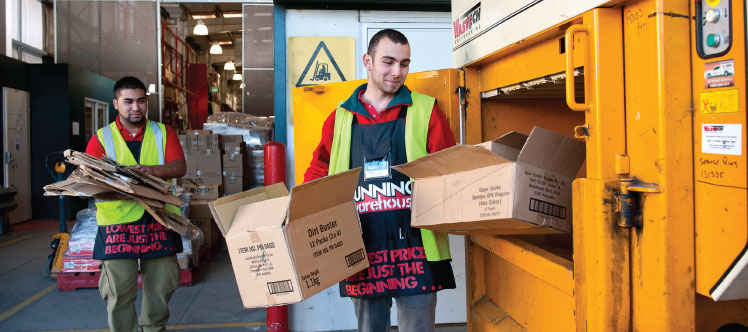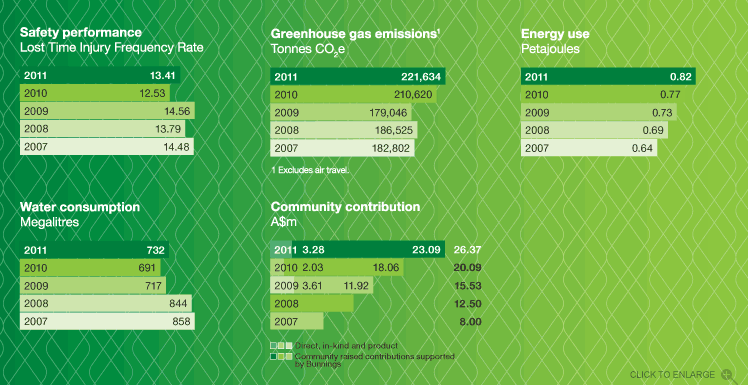Home Improvement and Office Supplies
Bunnings
Performance overview
Priorities and outcomes
-
Area 2010 Priority Outcome 
Environment Continue work towards carbon neutral growth and long-term footprint reduction  Partially achieved
Partially achievedWe have achieved a small reduction in the carbon intensity of our operations. This has been achieved mainly through new stores being more energy efficient. Total carbon footprint increased by 5.0 per cent which remains 1.0 per cent lower than net store growth 
Environment Continue work reducing scheme water usage and reducing waste to landfill  Partially achieved
Partially achievedDespite store network growth, scheme water usage remained consistent, with Australian stores using 677.3 megalitres and New Zealand stores 54.6 megalitres
New stores continued to be fitted with water tanks and innovative nursery irrigation techniques
Maintained waste diversion rates with stores recycling 60 per cent of waste in Australia and 36 per cent in New Zealand
Stakeholder
engagementContinue work with suppliers to reduce supply chain resource waste and develop products with stronger sustainability traits  Partially achieved
Partially achievedEngaged with suppliers on packaging reduction and continued to provide sustainable product choices for customers
More than 99 per cent of timber products were purchased from low risk plantations, or other verified legal or certified sustainable forest operations. Forest Stewardship Council (FSC) certified product purchases reached 37 per cent
Community Continue providing customers with access to information about environmentally-friendly products and projects that can support sustainable living  Achieved
AchievedContinued to provide customers with access to information online and in-store through a range of sustainable products, catalogues and DIY projects. Launched the online Sustainability Savings Planner, Sustainability Savings Planner booklet and DIY workshop 
Community Maintain our contributions to improve the social wellbeing of the communities in which we operate  Achieved
AchievedContributed and helped raise more than $26 million in direct donations and in-kind support. More than 100,000 hours of team member labour went into supporting local community projects 
Safety Reduce our All Injury Frequency Rate (AIFR) by 15 per cent through dedicated campaigns and initiatives that target injury hot spots and high risk activities  Not achieved
Not achievedSlight increase in injuries has resulted in a 1.36 per cent increase in AIFR
More than 10,000 hours were dedicated to training of safety improvement teams
Overview of the business
About our business
Bunnings is the leading retailer of home improvement and outdoor living products in Australia and New Zealand and a major supplier to project builders, commercial trades people and the housing industry.
Operating from a network of large warehouse stores, smaller format stores, trade centres and frame and truss manufacturing sites, Bunnings caters for consumer and commercial customers.
Sales revenue during the year was $6.8 billion. At year-end there were 194 warehouses, 59 smaller format stores, 36 trade centres and seven frame and truss centres operating across Australia and New Zealand. At 30 June 2011 we employed 31,370 team members.
Year in review
We continued to work on initiatives across our sustainability agenda aimed at using less energy, using less water and creating less waste. Ultimately this will reduce our long-term carbon footprint, which we consider a higher priority than purchasing carbon offsets. The energy efficiency of our new stores and retro-fitting energy efficient lighting in existing stores has helped us progress towards this goal. Excluding previous year's purchase of offsets, our total carbon footprint increased by 5.0 per cent which is pleasingly slightly lower than our network growth.
Installation of energy efficient e-tronic lighting technology continued to be installed in new stores, with 29 stores now completed. Micro renewable power generation projects continue in Western Australia and the Australian Capital Territory with results providing a greater understanding of current technologies and their future potential to reduce electricity-related greenhouse gas emissions. Development of a comprehensive sustainability database has commenced which will monitor and report carbon footprint by store.
Waste recycling rates remain stable at 60 per cent and we are now focusing on lifting performance in stores with lower diversion rates, identifying remaining recyclables in our waste streams and introducing back-loading of cardboard and plastic in some regional areas. Rainwater tanks and capillary mats continued to be installed in all new stores which helped maintain our water conservation efforts.
To help make sustainability easier and more affordable for customers, we launched the online Sustainability Savings Planner, provided a free Sustainability Savings Planner booklet and ran free sustainability themed DIY workshops.
Our timber procurement approach in Australia and New Zealand is industry leading, with 99 per cent of timber products now sourced from low risk plantations or other verified legal or certified sustainable forest operations.
We also continued to actively support the Australian Government's commitment to introduce effective legislation to ban illegally-sourced timber imports.
We continued to increase our community support through more team member-led community projects, product contributions and fundraising sausage sizzles to assist the communities in which our stores operate. We also provided emergency assistance to many communities affected by natural disasters including the Queensland floods and Christchurch earthquakes.
Material issues
While carbon neutrality remains an aspirational target we have refined our short-term goal to focus on carbon neutral growth and long-term footprint reduction. In the short-term, further large reductions to our total carbon footprint may be affected by the constraints of current technologies and their commercial application.
It is a challenge for our business to maintain a consistent downward trend in our injury performance and we continue to look for innovative and effective ways to drive improvements in this area. We were disappointed in safety performance outcomes during the period.
People
Building a stronger team and keeping everyone safe is central to what we set out to do every year.
While the improvements that we achieved in our safety performance last year were not repeated this year, we remain focused on developing and supporting site safety improvement teams.
We believe that safety improvements can only occur if we engage and involve everyone and more than 10,000 hours were dedicated to further train and up-skill our safety improvement teams to ensure they are effective in supporting health and safety on-site.
An increase in forklift incidents was mainly due to improved 'near miss' reporting and greater awareness of our forklift operators to report incidents as they arise. Lessons learned from common occurrences are shared across the business to prevent repeat incidents from occurring.
Some of the key programs that were launched during the reporting period included:
- The 'choices' campaign including a film targeting the impact of doing nothing when it comes to safety
- Training and coaching programs for forklift operators and walkie stacker users
- Updating the BSAFE System to simplify health and safety procedures and processes on-site
- A team member health assessment program across all sites in Australia and New Zealand where more than 7,000 team members received a free health check
- New injury management arrangements for New Zealand sites to improve return to work outcomes for injured team members.
Environment
Our commitment to reducing our environmental impact includes energy efficiency measures, water conservation, responsible sourcing and packaging waste reduction. It also includes a consistent focus on sustainable timber procurement to ensure that timber and wood products come from legal and well-managed sources.
We implemented a new integrated environmental KPI monitoring and reporting system known as 'Treadlite'. The system will be fully deployed during the 2012 reporting period, delivering enhanced reporting and analysis on a comprehensive range of indicators.
Our websites www.bunnings.com.au and www.bunnings.co.nz contain comprehensive water and energy saving information to help customers reduce their environmental impact through sustainable living and product choices.
Energy
Energy efficiency through in-store lighting technology remains a key focus with 11 new warehouse stores fitted with energy efficient e-tronic lighting during the year.
We have also introduced light emitting diode (LED) lighting in outdoor areas as a standard in the new store design brief.
We continue to monitor solar and wind micro generation demonstration projects in the Australian Capital Territory and Western Australia.
Heat reflective paint trials continue to provide favourable results leading on from the Townsville (Queensland) success reported last year. We are hopeful that these extended trials will prove effective and a roll-out to northern Queensland and Northern Territory sites can be progressed by the end of 2011.
Greenhouse emissions
Our total greenhouse gas emissions (excluding air travel) were 221,634 tonnes of CO2e, five per cent up on last year. These emissions were largely due to electricity consumption at our stores.
Our total carbon footprint increased by five per cent which is pleasingly lower than net site growth of six per cent. The actual carbon intensity of our operations has remained constant compared to last year at 3.3 tonnes of CO2e per $100,000 of revenue.
This comparison is based on the total gross emissions from last year, excluding the offsets that were purchased, as no offsets were purchased in this reporting year.
Water
Scheme water usage was 732 megalitres, which is an increase of six per cent overall. Australian-based store consumption was up eight per cent and New Zealand-based stores down 13 per cent on last year.
Reducing waste and recycling
We continue to work towards our 85 per cent waste diversion target with our Australian stores maintaining a waste diversion rate of 60 per cent and New Zealand stores 36 per cent. During
the year, we disposed of 17,991 tonnes of waste to landfill and recycled 8,926 tonnes
of cardboard and paper and 493 tonnes
of plastics.
We introduced back-loading of recyclables including polystyrene from Western Australian stores and cardboard and plastic from regional sites where commercial recycling is not available.
A trial is also being conducted in Western Australia to determine the viability of an organic waste recycling stream for green-life organic waste from our nurseries.
Store waste diversion reports are provided via our intranet to enable benchmarking comparisons between locations.
Packaging
Our supplier sustainability roundtable program engages with a selection of major suppliers about our sustainability drivers and gauges their current level of activity around carbon reduction, eco-efficiency, packaging and ethical sourcing matters. One of our garden tool suppliers, Cyclone, conducted a packaging rationalisation assessment on key product ranges. A time and motion study is planned once reduced packaging flows through to stores to assess the benefits when unpacking products.
Ethical sourcing
We continued our factory accreditation program for products we directly import. Major overseas factories are audited to a code of conduct based on the International Labour Organization conventions. Part of this process requires factories to be visited and inspected by an independent auditor, our agents or our buyers. During the year, a total of 509 audits were conducted, representing 42 per cent of our total imported product purchases.
We introduced a Timber and Wood Products Purchasing Policy in 2003 and have a zero tolerance to illegal timber. We work closely with our suppliers in order to establish a condition of supply that requires independent verification of legal origin as a minimum for all products made completely from tropical hardwoods.
Of our timber products, 99 per cent are now sourced from low risk plantations or other verified legal or certified sustainable forest operations. In addition, 84 per cent are from certified sustainable sources, including 37 per cent that are FSC certified.
Our New Zealand operation has also adopted our annual supply chain survey and continues to work collaboratively with the Government, New Zealand Tropical Timber Importers Group and environmental organisations to encourage sustainable timber procurement.
Stakeholder engagement (public policy)
We continue to engage with different levels of government and non-government organisations to work collaboratively on issues and identify further opportunities to work together.
In April 2011, we played an active role in promoting the proposed ban on the importation of illegally logged timber by signing the Common Platform and encouraging action from industry, consumers and Federal Government. This followed our support of the Greenpeace-led joint statement in 2009 which called for an Australian Government ban on the importation of illegally logged timber into Australia. We also continue to work with WWF as a member of the Global Forest and Trade Network (GFTN).
In June 2011, we became the first retail partner of FSC Australia. FSC will provide education and information for team members and customers on the benefits of FSC certification and we will work together to assure that our timber products are from responsible sources.
2011 is the United Nations Year of Forests and we have partnered with WWF in their Love Your Forests campaign to raise awareness of responsible forest management.
We continued to work with local councils and community groups to offer compact fluorescent lights and battery recycling programs at selected stores in New South Wales, Western Australia and Victoria.
Sustainability Victoria delivered 473 in-store training programs in 2011 on water and energy rebates available and sustainable products. We also continued work with local councils on sustainability DIY workshops.
Education and awareness
During 2011, New Zealand supported Earth Hour through sustainability themed workshops and a sustainability walk with local schools. In June 2011, we actively supported World Environment Day through DIY workshops, merchandising sustainable product displays with local suppliers and councils. Australian stores for the fourth consecutive year held water saving DIY workshops for National Water Week.
Western Australian stores and the Water Corporation launched their first showerhead exchange program, exchanging more than 57,000 showerheads. This program was based on the Victorian model that this year saw more than 13,000 showerheads exchanged at metropolitan stores.
We launched the interactive Sustainability Savings Planner on our Australian website, to help make sustainability easier and more affordable for customers. The online tool allows customers to undertake an individual assessment of their home and garden and produces an action plan which suggests products to implement and associated savings. It is supported by the Sustainability Savings Planner booklet and DIY workshop.
In 2011, we conducted a sustainable timber purchasing seminar in partnership with FSC Australia and WWF, which was attended by senior marketing and merchandising team members. We also worked with TAFE NSW to deliver a 'Sustainability Solutions' online training program which is now available to all team members and is included on the sustainability training intranet pages.
Voluntary team member Green Action Groups continue to look for opportunities to reduce energy and water usage and drive waste reduction.
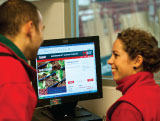
New online Sustainability Savings Planner.



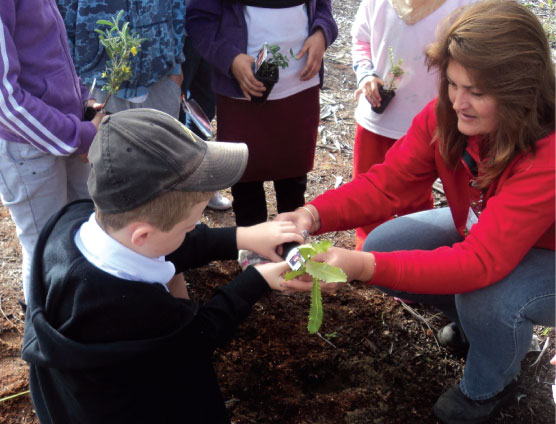
Community
Actively participating in the local communities in which we operate is integral to all of Bunnings' community involvement activities. We contribute to a diverse range of local, regional and national programs in Australia and New Zealand and we continue to embrace the 'we live here too' philosophy throughout our team.
During 2011, New Zealand launched phase one of their schools sustainability program. This program follows the Australian model which saw more than 900 school sustainability visits conducted last year. Australian stores also supported Schools Tree Day, founded by Planet Ark, for the third consecutive year through a native tube stock planting activity with local students. We also continue to support Green Up Clean Up through local planting and clean-up activities and Firestarter Youth Environment Conferences by providing materials and hands-on native bird box building workshops.
Australian stores supported a number of organisations through locally driven, store run activities. These included the Prostate Cancer Foundation of Australia, White Ribbon Day, St Vincent de Paul and The Salvation Army in several states and territories, local emergency services, Returned and Services League, Legacy, Lions and Rotary groups, young mother groups and the Red Shield Appeal.
Our New Zealand stores supported the Red Cross, Cancer Society and Mental Health Foundation (Movember), St John Ambulance, Lions and Returned Services Association, Heart Foundation, Child Cancer Foundation, @Heart and active support of Keep New Zealand Beautiful Clean Up Week.
We are committed to an ongoing, active and engaging role within each of our local communities and through this support we were able to contribute and help raise more than $26 million. Our teams supported well over 42,000 community activities through fundraising sausage sizzles, hands-on DIY projects and renovations, local fundraising activities, community workshops and more. Our support included hands-on team member involvement, product contributions and financial assistance.
We were able to provide emergency assistance to many communities affected by natural disasters including the Queensland floods and Christchurch earthquakes, including raising more than $730,000 for the Queensland Premier's Disaster Relief Appeal.
Bunnings also committed a further $1 million to directly support impacted local communities in Queensland with their recovery and rebuilding efforts and has been actively supported by on the ground assistance from Bunnings team members.
Over $130,000 was raised for the Christchurch Earthquake Appeal through community family events held in Australian and New Zealand stores, along with barbeques held across New Zealand. Bunnings also contributed a further $100,000 to the Appeal consisting of a $50,000 donation to the Red Cross and $50,000 to support local community projects in areas affected by the earthquakes.
For further details on our sustainability performance, please go to our sustainability pages at www.bunnings.com.au and www.bunnings.co.nz
Bunnings – 2012 priorities
- Continue to work towards carbon neutral growth and long-term footprint reduction
- Increase waste diversion rates and continue to reduce scheme water usage
- Increase work with suppliers to reduce product packaging and supply chain resource waste
- Drive more sustainable product development and continue providing customers with access to information about environmentally friendly products and projects that can support sustainable living
- Maintain our contributions to improve the social wellbeing of the communities in which we operate
More than 900 school sustainability visits conducted.
Left: Tree planting activities with Bunnings Malaga team members in Western Australia.

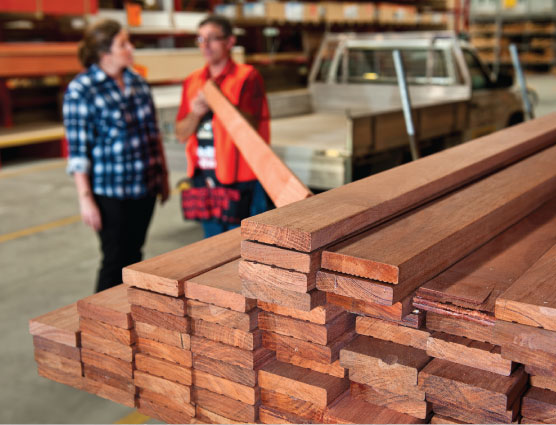
Timber supply chain approach
Bunnings has had a zero tolerance approach to illegal timber in its supply chain since 2001. Since then, our sustainable timber purchasing policy has provided a framework to transition towards achieving third party certified timber products.
Key achievements over the past decade include:
- being the first retail partner of the WWF Global Forest Trade Network in 2004
- launching our exclusive FSC certified outdoor furniture range in 2007
- being the lead retail signatory to the 2009 Greenpeace-led joint statement calling for a Federal Government ban on illegal timber imports into Australia
- supporting the Common Platform statement which reinforced the call for effective legislation in 2011
- partnering with WWF in the Love Your Forests Campaign in 2011, and
- becoming the first FSC Australia retail partner in June 2011.
We continue to make improvements in this area and work collaboratively with Greenpeace and WWF.
We are proud to report that more than 99 per cent of timber products purchased are sourced from low risk plantations or other verified legal or certified sustainable forest operations. While we make no claim to be perfect, we genuinely believe that this is the right thing to do and we know that customers and our team members expect this from us.
More than 99 per cent of timber products purchased are sourced from low risk plantations or other verified legal or certified sustainable forest operations.
Left: Timbertrade sales area at the Bunnings Cockburn Warehouse, Western Australia.

